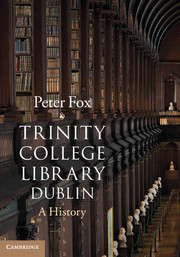Book contents
- Frontmatter
- Dedication
- Contents
- List of illustrations
- List of tables
- Acknowledgements
- Abbreviations
- Introduction
- 1 Early days: 1592–1640
- 2 Ussher, Kells and Durrow: 1641–1665
- 3 Alexander, Bath and the Jacobites: 1666–1708
- 4 A new building: 1709–1737
- 5 Stearne, Gilbert and Lyon: 1738–1749
- 6 The Library in 1750
- 7 Leland to Barrett: 1751–1800
- 8 Fagel: 1798–1809
- 9 Barrett: 1801–1821
- 10 Sadleir, Wall and Todd: 1822–1851
- 11 The Library in 1850
- 12 Todd as Librarian: 1852–1869
- 13 Malet and Ingram: 1869–1886
- 14 Abbott: 1887–1913
- 15 Smyly: 1914–1948
- 16 The Library in 1950
- 17 Parke: 1949–1965
- 18 Professional management: 1965–1983
- 19 Epilogue: 1984–2003
- Appendix 1 Librarians, Assistant Librarians and Deputy Librarians1
- Appendix 2 Growth of the collection
- Appendix 3 The Library oath and declaration
- Sources and select bibliography
- Index of Trinity College Dublin manuscripts
- General index
- Plate Section
- References
13 - Malet and Ingram: 1869–1886
Published online by Cambridge University Press: 05 June 2014
- Frontmatter
- Dedication
- Contents
- List of illustrations
- List of tables
- Acknowledgements
- Abbreviations
- Introduction
- 1 Early days: 1592–1640
- 2 Ussher, Kells and Durrow: 1641–1665
- 3 Alexander, Bath and the Jacobites: 1666–1708
- 4 A new building: 1709–1737
- 5 Stearne, Gilbert and Lyon: 1738–1749
- 6 The Library in 1750
- 7 Leland to Barrett: 1751–1800
- 8 Fagel: 1798–1809
- 9 Barrett: 1801–1821
- 10 Sadleir, Wall and Todd: 1822–1851
- 11 The Library in 1850
- 12 Todd as Librarian: 1852–1869
- 13 Malet and Ingram: 1869–1886
- 14 Abbott: 1887–1913
- 15 Smyly: 1914–1948
- 16 The Library in 1950
- 17 Parke: 1949–1965
- 18 Professional management: 1965–1983
- 19 Epilogue: 1984–2003
- Appendix 1 Librarians, Assistant Librarians and Deputy Librarians1
- Appendix 2 Growth of the collection
- Appendix 3 The Library oath and declaration
- Sources and select bibliography
- Index of Trinity College Dublin manuscripts
- General index
- Plate Section
- References
Summary
John Adam Malet
The Board did not immediately fill the vacancy left by Todd's death, but appointed the Assistant Librarian, Benjamin Dickson, to be the acting Librarian. With the summer intervening, it took several months before the process of appointing a new Librarian began in earnest. When it did, Dickson put his name forward, as did Richard Gibbings, now Professor of Ecclesiastical History, and William Reeves, now rector of Tynan, County Armagh, and librarian of the Diocese of Armagh. Interest in the filling of the post was not confined to the College community. The Irish Times published a lengthy editorial in which it compared the relative merits of Dickson and Reeves, whom it regarded as the principal candidates. It claimed that the Library was better supplied ‘with ancient than with modern books’, and in a clear reference to Dickson said that what was needed was a Librarian ‘conversant with the latter department’. In the end the Board selected none of those candidates and again chose to appoint one of its own members, John Adam Malet, a Senior Fellow, elected Librarian on 27 November 1869.
Malet's career to date had been singularly undistinguished, his only publication having been the catalogue of the Library's Roman coins compiled 30 years earlier, though he is credited with having discovered and identified the oldest record of the College, known as the Particular Book, in what was described as a ‘waste-paper-basket store’ in the Library. As Librarian, his relationship with the Board and with other Fellows was an uneasy one, and his tenure of office was characterised by apparently impetuous decisions, several of which subsequently had to be reversed. His dealings with Dickson were problematical from the start. Having been passed over for the Librarianship, Dickson had been invited to continue as the Assistant Librarian, initially for 5 years, at a salary of £100, and had agreed. The Library minute book records his appointment as the Assistant Librarian, but includes a note by Thomas French that Malet had ‘obliged’ him to write this, even though Dickson had actually been appointed by the Board to be the ‘Second Librarian’. The University Calendar for 1870 follows French in listing Dickson as the Second Librarian and Hunt as the Assistant Librarian.
- Type
- Chapter
- Information
- Trinity College Library DublinA History, pp. 210 - 231Publisher: Cambridge University PressPrint publication year: 2014



